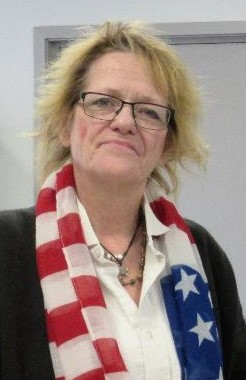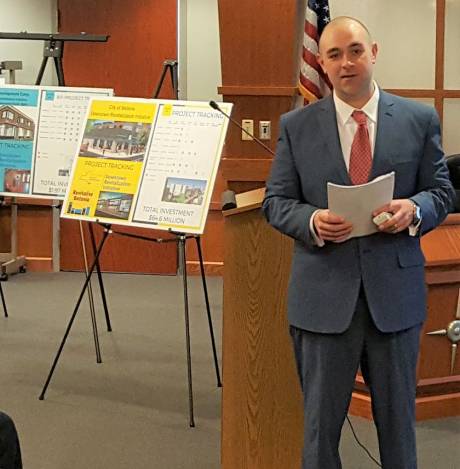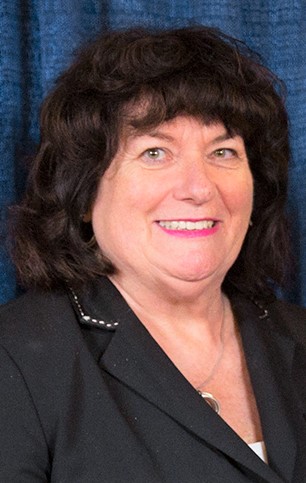A representative of the company looking to build the largest solar project ever in New York State says that building relationships with Town of Elba and Oakfield officials and residents are the keys to finding a path to a finished product that benefits everyone.
Speaking by telephone from his Chicago office last week, Harrison Luna (photo at right), development manager for Hecate (pronounced Heck-A-Tee) Energy, said things are progressing smoothly more than a year after the solar company announced its intention to place a 500-megawatt solar farm on what is now 2,452 acres of farmland in the north portion of the adjoining towns.
On June 3, Hecate Energy filed an application with the New York State Office of Renewable Energy Siting (ORES) to construct the solar system, which Luna said represents a $500 million-plus investment that will create more than 500 construction jobs – and about 12 permanent full-time jobs -- and will be capable of supplying 920,000 megawatt hours of renewable electricity per year.
Luna said he has been impressed with the feedback from governmental leaders in both towns, who have interacted with him through three open houses and numerous other meetings – virtually and in person. He said that he places a high priority on understanding the views and concerns of the local citizens.
“Just from my perspective, the only way these projects really work is when they come with a respect of the communities they deal with – by building relationships in the community,” he said. “You can’t do that without having a conversation, early and often. That’s how we’ve been doing it the whole time.”
COMMUNICATION LINES ARE OPEN
Luna said he has been in constant contact with town officials, landowners and neighbors, noting that there have been three virtual open houses with hundreds of people participating.
He also holds Zoom calls outside of his office hours for people to speak to him, and has set up a dedicated phone number and email address for people to call with questions or concerns. He said he returns those calls and emails as soon as possible.
A press release from Hecate Energy included comments from the Oakfield and Elba town supervisors, with both Matt Martin and Donna Hynes, respectively, giving the company high marks for keeping them informed “every step of the way” and offering a project that will result in significant financial benefits to both municipalities.
When contacted by The Batavian, Martin said that in his town, things are progressing without controversy.
“I had one resident ask about if the town wanted it or didn’t want it and I said, basically, that we have no choice,” he said. “The state dictates what they do with the solar panels; the state is running the show, not us.”
Martin acknowledged that the economic benefits will be significant – likely in the millions for both towns, the Oakfield and Elba school districts and other taxing entities – but said those, too, “are beyond our control.”
“We can publish what those benefits are but I don’t think they’ve got those numbers outlined yet,” he said. “As things progress, we’ll have some more information. Nothing like this moves really fast.”
A call to Hynes has not been returned.
NEW STATE AGENCY CONTROLS THE CLOCK
As far as the timetable is concerned, Luna said that ORES -- the state agency that has replaced the Article 10 permitting process for large-scale renewable projects -- has 60 days to determine whether Hecate Energy’s application is complete. The Cider Solar Farm is the first application submitted under ORES.
“They are set up sort of as a one-stop shop and a point of contact for everybody to work through the permitting items together,” Luna said. “I think the difference there is that in Article 10, interaction with agencies was hectic – you would talk to individual agencies – while here it’s more of a clearinghouse for all of those interactions with the state.”
Once ORES deems the application is complete, there’s a one-year clock it has to work through the various items in order to issue or deny a permit, Luna said. It could stretch beyond that (or move faster) depending upon the application checking all of the boxes.
Luna said once the permit is received, the company would be ready to start construction, hopefully by next summer. Construction is expected to take 18 months.
He said he projects that about 500 full-time equivalent jobs will be created during construction and around a dozen permanent jobs afterward.
“Once it is built, it is relatively low maintenance,” he said, adding that workers will be paid prevailing wage and “that you would expect a concentrated labor force of local residents.”
THIRTY-ONE LANDOWNING ENTITIES
What began as a 4,000-acre proposition has decreased to 2,452 acres, and that’s all by design, Luna said.
Currently, 31 landowning entities (controlling 67 parcels) have options to lease their land to Hecate Energy, with a few of them being different entities controlled by the same family.
The major landowners are Call Farms Inc., with more than 1,000 acres, along with Norton Farms (approximately 600 acres), Offhaus Farms Inc. (approximately 500 acres), and Eugene Bezon (approximately 300 acres).
Others with around 100 acres are Big O Realty LLC; CY Properties; Gene H. Sharp; David Shuknecht; and Lynn Shuknecht.
CLICK HERE for a complete list of landowners of record. Note that the acreage totals may have changed due to the “honing” process.
“The way that works is originally we went and sought options and lease agreements for 4,000 acres of land,” Luna said. “The reason we start that big is to give us enough room to move with the desires of the community and hone that project to the best possible version it could be. Over time, as we’ve listened to the community on certain things – how far it sets back from the road and various other concerns – we start pulling back and honing it to something much smaller.”
He called it a “useful exercise” -- one that considers protected wetlands and endangered species.
In the case of the Cider Solar Farm, less than 2/10ths of an acre of state-regulated wetlands has been permanently impacted, he said.
NAAS: PROPERTY OWNERS HAVE A CHOICE
Bruce Naas
(photo at right), president of the Genesee County Farm Bureau, has signed an option to lease 60 acres of land on Naas Farms LLC on Lockport Road in Oakfield for the solar project.
“My opinion has always been, if you own the property, it’s not like I am going to tell somebody else what do to with it,” Naas said. “If it is something that benefits you and your family in the long-term plan, then it’s something … it’s a decision that you have to make.”
Naas said the land that he is leasing is a small portion of the family farm, which grows vegetables, soybeans, corn and wheat.
“We here at our farm, elected to put the poorer ground into solar. It would not generate the income that we have been offered by the solar company – growing row crops. So, for us, it’s strictly a business decision.”
He said he hopes that solar works out in the long run.
“My biggest fear with solar is that it is something I would assume as time goes on would become more efficient … I hope as we move forward, that these things don’t become obsolete before their lifespan,” he said. “I guess from the sounds of it, it is an objective that the governor and political leaders want us to meet, and either you say ‘Yes’ or the train passes you by.”
Naas mentioned the economic advantages for the community, but added that his “biggest concern was that I have to look it at for the rest of my career.”
The farm bureau has no official position on solar, Naas said, reiterating his stance that it is the property owners’ choice “unless it directly affects someone else.”
A call to Call Farms for comment from one of the owners was not returned.
MILLIONS OF DOLLARS IN THE PIPELINE
Just as the public has seen with the Excelsior Energy Project in the Town of Byron, where the taxing jurisdictions stand to gain millions over the 20-year term of the agreement, the towns of Elba and Oakfield, their school districts, special fire districts, Genesee County and the Haxton Memorial Library will reap financial rewards.
The landowners receive direct compensation through their lease agreements (which generally are believed to pay between $500 and $2,000 per acre per year).
“Our goal is to try to make sure everyone benefits; everyone in the community as well as the company as well as the State of New York as well as landowners,” Luna said. “We want it to be positive for everybody involved.”
Towns and other interested parties also have access to $500,000 in intervener funds – money made available to help towns and groups/individuals evaluate the impact of the project.
“Local people have a voice in this and they will coordinate with ORES as it makes funding available over the next two month to the towns and other interveners,” Luna said. “The towns can use that to get their heads around what exactly is going on. Towns request the amount they need or want, ORES takes a look at every intervener funding request and allocates that funding to the towns and other pertinent entities – with the towns having first place in line.”
Luna did not speak to whether Hecate Energy would be applying for tax incentives or payment in lieu of taxes through the Genesee County Economic Development Center, stating that the process has yet to reach that stage.
DISCOUNT ON CONSUMERS’ ELECTRIC BILLS
He did point out that every resident of Elba and Oakfield will receive a direct utility bill reduction in connection with the project.
“We will send money to the utility that they must take off people’s monthly utility bills … for the first 10 years,” he said. “We pay a fixed amount per year to be distributed to town residents. It will probably about $100 per year for each resident, but that will be determined.”
Luna, responding to a question about the flow of electricity from the system, said power generated on the grid flows to the nearest user of electricity.
“It will be used as close to as it is generated as there is demand for it,” he said, adding that the system would produce enough electricity to power all of Genesee County “and then a little bit more.”
Hecate Energy has entered into a Renewable Energy Credit (REC) contract with the New York State Energy Research and Development Authority, Luna said.
“We sell environmental benefits of the project, which are tracked using these objects called RECs,” he said. “We’ll sell those under contract to the state, or NYSERDA, where they get to retire them and take credit for the ‘green’ goals that the state has – which are quite ambitious.”
He said his company seeks to demonstrate that it is meeting the state’s goals.
“It’s not a contract to sell the power. We’re not selling power; we’re capacity to the state,” he added. “We can sell the power under this contract to the open market so that any user of electricity that is eligible to buy electricity, we can sell it flexibly.”
TORREY MARSHALL: WE CHOOSE TO FARM
Luna said he has encountered no organized opposition – “I’m knocking on wood as I’m saying that,” he noted – and attributes that to the level of interaction thus far.
“I think it’s a real difference when you’re generally putting these communities first in your mind when you doing anything. I think people can tell. I think it’s really important if people really care about communities when they do these things as it really makes everything a lot better,” he said.
While that may be true, not everyone is thrilled that solar has become such a hot commodity at the expense of farming.
Maureen Torrey Marshall (photo at right) of Torrey Farms, a major agricultural enterprise in Elba and surrounding towns, said she thinks “it’s sad that solar panels are the most viable crop that farmers can grow.”
“Well, you can’t fault anybody because they can’t get that type of return by growing any crops, but it all goes back to New York State,” she said. “I’m on the (Elba) town board and we’re going to try to get as much (money) as we can, but you can’t fault anybody. The town and the school need to benefit as much as they can from this.”
She said that solar is going to change the look of the community – and it’s not about to stop in Elba and Oakfield.
“That is what is going to happen down in the valley along (Interstate) 390, near Mount Morris – all that beautiful farmland in that area. That’s all going to be solar,” she said. “New York has placed a priority on green energy and it has just steamrolled.”
Torrey Marshall said her operation is not leasing land to the project.
“You get letters – these companies are just coming out of the woodwork. To be honest, all of Route 98 going to the Thruway could be solar panels,” she said. “It’s our choice and our choice is to farm.
“Elba has survived on agriculture ever since it was founded. Then you have people saying that this is so great. It’s sad that this is the best viable use for your land right now.”
ZUBER: TAKING FOOD OUT OF OUR MOUTHS
Eric Zuber, of Byron, part of the organized opposition to the Excelsior Energy Project, said he owns farmland on the fringes of the Cider Solar Farm but is not signed up to lease any land.
“The quality of ground they are taking in that one is not the quality of the ground here. It’s productive soil but it isn’t the soil that is being taken for the project in Byron,” he said. “Still, I think all of these projects on farmland are stupid. I think, if I had the right type of guys come in here, they could prove that it will create more carbon than it’s going to prevent.”
Hecate Energy contends that the Elba/Oakfield solar system is projected to offset more than 420,000 tons of carbon dioxide per year, the equivalent of taking over 92,000 average cars off the road annually.
Zuber said he is on board with smaller solar farms on side yards or on roofs of homes, “but when they start doing these big projects, they’re taking the food out of people’s mouths.”
“Go to the grocery store and buy food. What has it done in the last six months? You need another $50 in your pocket to buy your groceries,” he said. “All they’re doing is making people hungrier and making the poor people poorer.”
THE BEST APPLE CIDER IS HERE
Luna acknowledged that not everyone is on board with solar panels along country roads.
“There are always some people who aren’t really excited, which is natural for a project of this scale,” he said. “What we do in that case, which again I think is really positive, is try to interact directly with those people and have one-on-one conversations – because sometimes we can help. If they’re concerned that they will be looking at panels all day, we can put visual screening there that mitigates that visual impact. That can make people feel more comfortable in many cases.”
He said Hecate Energy is committed to community involvement and will be looking at opportunities as the project progresses.
The solar company is hosting a fire training for first responders in Elba and Oakfield next Monday night (June 21) at the Elba Firemen’s Recreation Hall in the village. Luna said it will be a comprehensive training in the event of solar fires or emergency situations in various applications – not just large-scale, ground-mounted systems.
So, as indicated, the clock is ticking on the Cider Solar Farm, a unique name for the project that came into Luna’s mind as he drank a glass of local apple cider.
“Funny enough, the first time I came up to town – I’m not exactly sure where it was – I was on the road looking for land that was suitable and getting prepared for meetings with landowners when I bought some apple cider at some place … and I said that this is the best cider I ever had,” he said. “I’m from Tennessee. I don’t know if it’s something about the climate or something else, but maybe our apples aren’t quite as good. But I really enjoyed the cider.”
Hence the name, Cider Solar Farm.




















